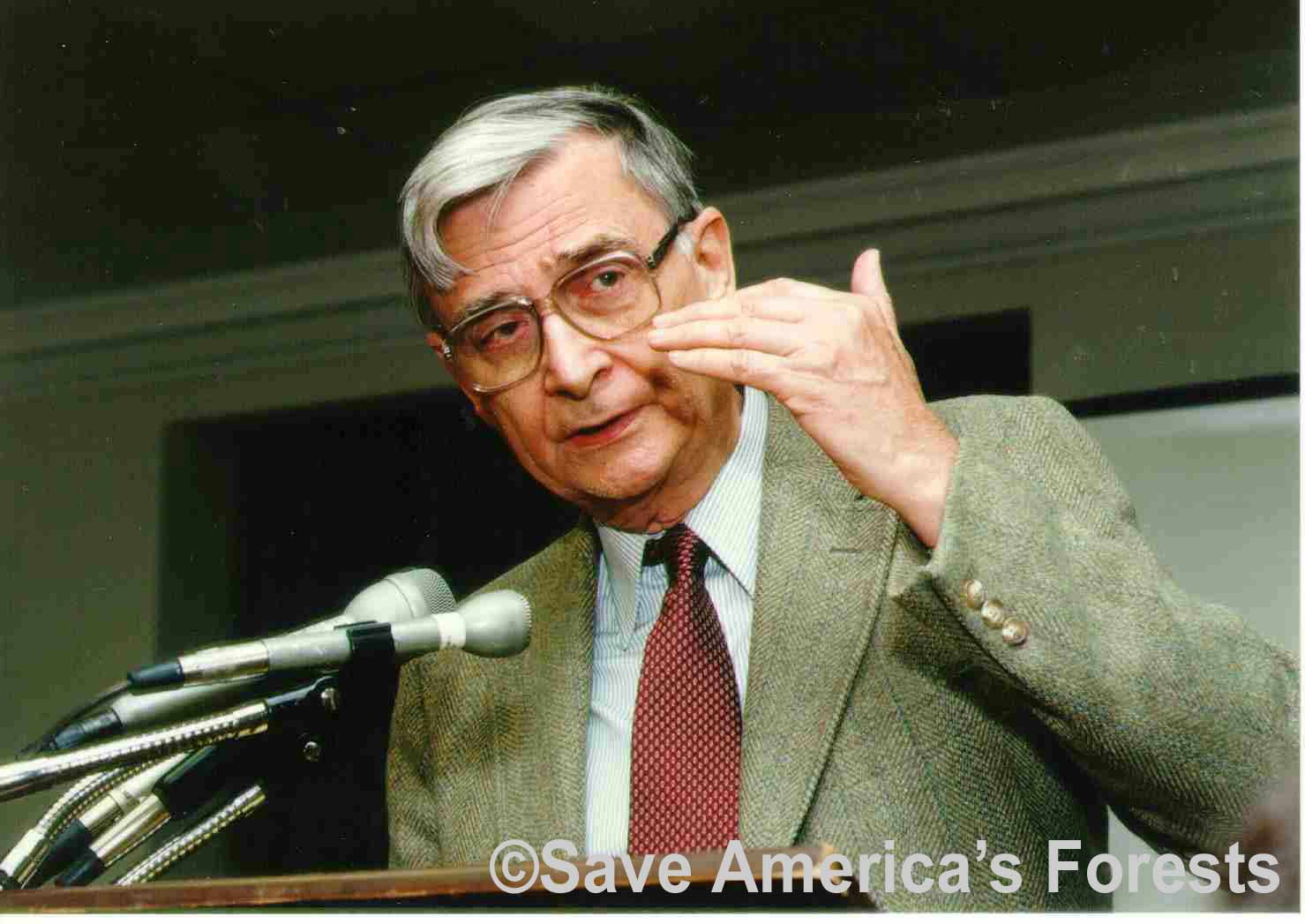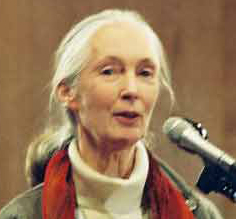|
E.O.Wilson:
Biography
Introduction
Dr.
Edward O. Wilson is one of the greatest thinkers of
the 20th and 21st century. His groundbreaking research,
original thinking, and scientific and popular writing
have changed the way humans think of nature, and our
place in it. Currently he is a research professor
and museum curator at Harvard University. He has received
many of the world's leading prizes for his research
in science, his environmental activism, and his writing.
Wilson has been a leader in the fields of entomology
(the study of insects), animal behavior and evolutionary
psychology, island biogeography, biodiversity, environmental
ethics, and the philosophy of knowledge. He has written
groundbreaking books and articles on all of these
subjects. Two of his non-fiction books, The Ants
(1990, with Bert Hölldobler) and On Human
Nature (1978), have won Pulitzer Prizes. The
Diversity of Life (1992) and Consilience: The
Unity of Knowledge (1998), two of his more recent
books, have been applauded for their graceful,
creative and constructive approaches to challenging
subjects. In The Diversity of Life and The
Future of Life he conveys his deep concern for
humanity's bewildering degradation of our planet's
ecosystems. His commitment to protecting our natural
heritage has brought him to the forefront of environmental
activism.
Personal
History
E. O. Wilson
grew up in Alabama. Early on in childhood he became
fascinated with the natural world, especially insects.
In high school he decided to devote his career to
the study of ants. He received a BS from the University
of Alabama in 1949, an MS in 1950, and his Ph.D. from
Harvard University in 1955. For most of his career
Wilson has been a professor at Harvard University.
He is currently a Pellegrino University Research Professor
and Honorary Curator in Entomology of the Museum of
Comparative 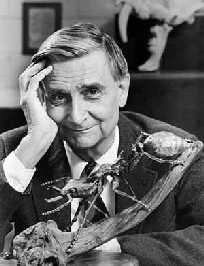 Zoology
at Harvard University. Wilson has won numerous awards,
honors, and fellowships for his research, writing,
and activism, including two Pulitzer Prizes (1978
and 1990), the1977 National Medal of Science, the
International Prize of Biology from Japan (1993),
and the Audubon Medal of the National Audubon Society
(1995). Zoology
at Harvard University. Wilson has won numerous awards,
honors, and fellowships for his research, writing,
and activism, including two Pulitzer Prizes (1978
and 1990), the1977 National Medal of Science, the
International Prize of Biology from Japan (1993),
and the Audubon Medal of the National Audubon Society
(1995).
Entomology
and Myrmecology
Much
of Wilson's intellectual development and explorations
have originated from his in-depth study of insects
(entomology), especially ants (myrmecology). Wilson
has been a pioneer in researching the physiology,
evolution, taxonomy, life cycles, chemical communication
, and social organization of social insects. His book
The Ants (1990, with Bert Holldobler) won a
Pulitzer Prize, and The Insect Societies
(1974) is still widely regarded as an important
reference and synthesis of the biology of social insects,
despite being outdated by thirty years.
Wilson
developed the foundations for understanding the biological
basis for social behavior in insects. He revealed
to the scientific community and the general public
the complexity of ant societies and their dominance
in terrestrial ecosystems. From this newly developed
understanding of insect behavior, Wilson began examining
the social behavior of other animals.
Animal
Behavior, Sociobiology, and Evolutionary Psychology
In
direct contradiction with the anthropocentrism of
many social scientists, Wilson strongly believed that
all animals, including humans, should not be excluded
from evolutionary analyses. He outlined a new field
of study, known as sociobiology, that demanded the
inclusion of the social sciences and the humanities
in evolutionary theory (Sociobiology: A New Synthesis,
1975). He provided biological explanations
for behaviors such as altruism, which although controversial,
helped to pave the way for modern behavioral biology.
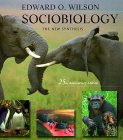 In
his book On Human Nature (1978) he examined
human behaviors in detail, arguing that some human
behaviors are naturally selected through processes
of evolution. His work was criticized by many for
its apparent message of "biological destiny." Thus,
throughout the late Seventies and Eighties, Wilson
was engaged in acrimonious debates with biologists
and social scientists, in particular Steven Gould.
Like Darwin's Origin of Species, Wilson's Sociobiologyand
On Human Nature have forced scholars to reassess
their understanding of the natural world. Today, many
scientists accept the basic premises of his arguments,
and he has been instrumental in the founding of evolutionary
psychology. In
his book On Human Nature (1978) he examined
human behaviors in detail, arguing that some human
behaviors are naturally selected through processes
of evolution. His work was criticized by many for
its apparent message of "biological destiny." Thus,
throughout the late Seventies and Eighties, Wilson
was engaged in acrimonious debates with biologists
and social scientists, in particular Steven Gould.
Like Darwin's Origin of Species, Wilson's Sociobiologyand
On Human Nature have forced scholars to reassess
their understanding of the natural world. Today, many
scientists accept the basic premises of his arguments,
and he has been instrumental in the founding of evolutionary
psychology.
Island
Biogeography and Conservation Ecology
Despite
his heated debates in defense of sociobiology, Wilson
was able to continue his exploration of the natural
world. In 1967, Wilson and R.H. MacArthur collaborated
to develop a theory explaining the uneven distribution
of species on different islands (The Theory of
Island Biogeography, 1967). They postulated that
the number of species on an island depends on a balance
or equilibrium between the rate of extinction on the
island (based on genetics, population sizes and ecology)
and the rate of species immigration or colonization
to the island. All else being the same, islands closer
to the mainland and with larger habitat areas tend
to have greater species diversity than smaller islands
further from the mainland. Their theory is remarkably
accurate and has become an important foundation of
modern conservation biology and ecology.
Wilson
has shown how the theory of island biogeography is
pertinent to conservation. Ecosystems found on continents
can also be isolated and fragmented, like islands
in an ocean. Habitat fragmentation has created many
"islands" that have undergone dramatic decreases in
biodiversity. Conservationists use the theory of island
biogeography to estimate the impacts of habitat fragmentation
and develop effective management plans.
Biodiversity,
the Environmental Ethic, and Activism
Wilson
has been increasingly concerned with the human-induced
environmental degradation and loss of biodiversity
on Earth. He has been a leader in bringing this concern
to the scientific community, the public, and politicians
through giving presentations at universities and conferences,
working with environmental organizations, and
writing and editing numerous articles and books (The
Future of Life, 2002; The Diversity of Life,
1992; Biodiversity, 1988; and others).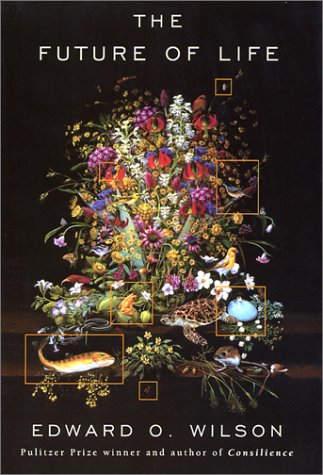 Today he devotes much of his efforts towards conservation
iniatives; he is on the Board of Directors of Conservation
International, the American Museum of Natural History,
and The Nature Conservancy. Since editing the book
Biodiversity (1984), which introduced the term
"biodiversity" and brought worldwide attention
to the topic, Wilson has been considered by many to
be "the father of biodiversity." In 1998 he delivered
a slide show in the
US Senate in support of the Act
to Save America's Forests, a bill that would
protect and restore the native biodiversity throughout
the federal forest system (which include the national
forest).
Today he devotes much of his efforts towards conservation
iniatives; he is on the Board of Directors of Conservation
International, the American Museum of Natural History,
and The Nature Conservancy. Since editing the book
Biodiversity (1984), which introduced the term
"biodiversity" and brought worldwide attention
to the topic, Wilson has been considered by many to
be "the father of biodiversity." In 1998 he delivered
a slide show in the
US Senate in support of the Act
to Save America's Forests, a bill that would
protect and restore the native biodiversity throughout
the federal forest system (which include the national
forest).
Wilson
profoundly respects and values our natural environment
and wishes to instill this value in others through
philosophical and scientific argumentation, as well
as more emotionally accessible approaches. He has
been important in spreading an environmental or "conservation
ethic"; he has helped the world realize the inherent
value of every species on Earth and humanity's inextricable
link with nature (Biophilia, 1986). Wilson
has also helped inspire several generations through
his beautifully descriptive prose of natural history
and his life adventures (Naturalist, 1995;
Journey to the Ants, 1994, with Holldobler;
and others). His dynamic teaching approach has taught
thousands of Harvard students the importance of evolutionary
principles and the need for environmental protection.
The
Future of Science and Humanity
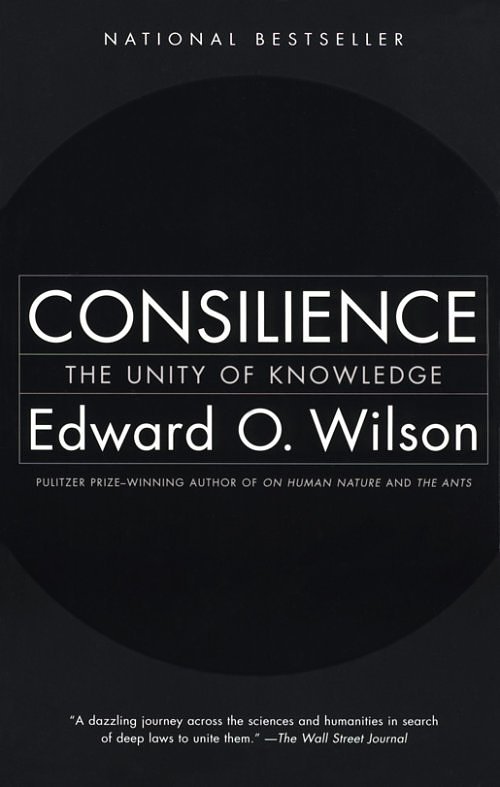 |
|
Despite
the discouraging state of many ecosystems, Wilson
has continued to think deeply and constructively
about a variety of intellectual problems. In Consilience:
The Unity of Knowledge (1998), he delves into
the philosophy of knowledge and science, arguing
for the unification of the humanities and sciences
into a coherent body of knowledge. He suggests
a closer examination of possible evolutionary
origins and functions of morality, the arts, and
religion. He strongly believes that our attaining
a unity of knowledge is an essential task in humanity's
path towards intelluctual enlightenment and living
in a non-destructive relationship with the natural
world. The humanities and sciences are interrelated
and humanity and the natural world are intertwined—damaging
our environment, distancing ourselves from our
human nature, can only cause future human suffering.
Wilson envisions a hopeful alternative and has
dedicated his life to showing others the value
and possibility of this vision. |
|
Dr.
Wilson strongly supports the Act
to Save America's Forests, which
is based on the core and buffer principle of
conservation biology. The Act would protect
and restore the native biodiversity throughout
the entire U.S. national forest system. Core
forest areas, including the last few percent
of remaining Ancient Forests and roadless areas,
would be protected from any logging and roadbuilding.
In the buffer areas, the native biodiversity
would have to be restored, non-native species
removed, and only ecologically sustainable use
permitted.
As
Dr. Wilson said,
"It
is critically important the Act to Save America's
Forests be passed into law as soon as possible.
The Act is essential to protect the forests
and biodiversity of America, and will prevent
countless plant and animal species from going
extinct.
The Act to Save America's Forests would
do more to protect biodiversity than any other
legislation."
In
the slide show and lecture
which Dr. E.O. Wilson presented in the U.S. Senate,
he explained why our national forests are in
grave danger, and why it is important to pass
The Act to Save America's Forests into
law.
Join Dr. Edward O. Wilson in his fight to protect wild biodiversity
Learn More About the
Act to Save America's Forests
|
Back
to Slide Show Introduction
Save
America's Forests Home Page
|

 Zoology
at Harvard University. Wilson has won numerous awards,
honors, and fellowships for his research, writing,
and activism, including two Pulitzer Prizes (1978
and 1990), the1977 National Medal of Science, the
International Prize of Biology from Japan (1993),
and the Audubon Medal of the National Audubon Society
(1995).
Zoology
at Harvard University. Wilson has won numerous awards,
honors, and fellowships for his research, writing,
and activism, including two Pulitzer Prizes (1978
and 1990), the1977 National Medal of Science, the
International Prize of Biology from Japan (1993),
and the Audubon Medal of the National Audubon Society
(1995). In
his book On Human Nature (1978) he examined
human behaviors in detail, arguing that some human
behaviors are naturally selected through processes
of evolution. His work was criticized by many for
its apparent message of "biological destiny." Thus,
throughout the late Seventies and Eighties, Wilson
was engaged in acrimonious debates with biologists
and social scientists, in particular Steven Gould.
Like Darwin's Origin of Species, Wilson's Sociobiologyand
On Human Nature have forced scholars to reassess
their understanding of the natural world. Today, many
scientists accept the basic premises of his arguments,
and he has been instrumental in the founding of evolutionary
psychology.
In
his book On Human Nature (1978) he examined
human behaviors in detail, arguing that some human
behaviors are naturally selected through processes
of evolution. His work was criticized by many for
its apparent message of "biological destiny." Thus,
throughout the late Seventies and Eighties, Wilson
was engaged in acrimonious debates with biologists
and social scientists, in particular Steven Gould.
Like Darwin's Origin of Species, Wilson's Sociobiologyand
On Human Nature have forced scholars to reassess
their understanding of the natural world. Today, many
scientists accept the basic premises of his arguments,
and he has been instrumental in the founding of evolutionary
psychology. Today he devotes much of his efforts towards conservation
iniatives; he is on the Board of Directors of Conservation
International, the American Museum of Natural History,
and The Nature Conservancy. Since editing the book
Biodiversity (1984), which introduced the term
"biodiversity" and brought worldwide attention
to the topic, Wilson has been considered by many to
be "the father of biodiversity." In 1998 he delivered
a
Today he devotes much of his efforts towards conservation
iniatives; he is on the Board of Directors of Conservation
International, the American Museum of Natural History,
and The Nature Conservancy. Since editing the book
Biodiversity (1984), which introduced the term
"biodiversity" and brought worldwide attention
to the topic, Wilson has been considered by many to
be "the father of biodiversity." In 1998 he delivered
a 
